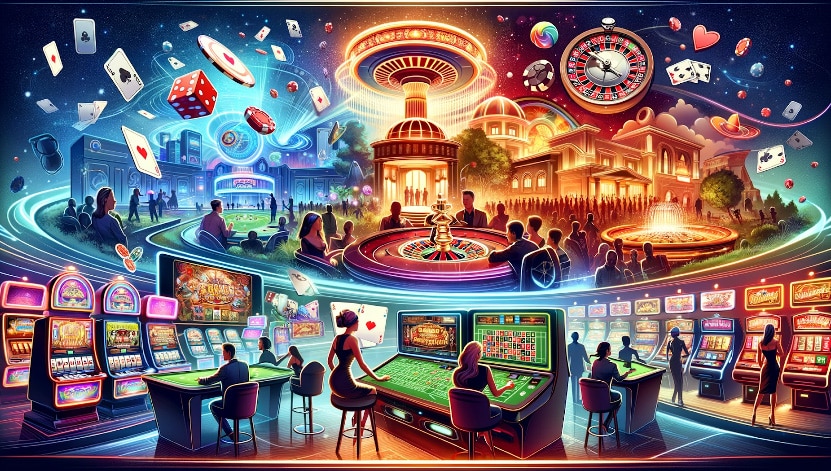The world of gambling games has experienced a remarkable transformation in past years, propelled by tech advancements and shifting consumer tastes. As an increasing number of gamers turn to digital mediums for entertainment, traditional gambling activities are being increasingly modified to satisfy the needs of a technology-oriented audience. This shift not just includes the transition from brick-and-mortar to digital spaces but also encompasses the evolution of gaming systems and player interaction techniques.
In this new digital age, game developers are leveraging cutting-edge techniques to develop immersive environments that resonate with a diverse spectrum of gamers. From online fruit games with stunning graphics to interactive table games that replicate the feel of a real-life casino, the modification process is redefining how we perceive and enjoy casino games. As we explore this fascinating process, it is clear that the future of gambling lies in the smooth integration of cutting-edge tech with the timeless appeal of chance and strategy.
The Evolution of Gambling Games
Casino entertainment have gone through significant evolutions throughout history, demonstrating transformations in technology, culture, and gamer choices. In ancient times, basic games of luck were enjoyed using simple items such as stones and animal remains. As societies progressed, so did the complexity of these games. The introduction of card games in the medieval period marked a key moment, culminating to the development of popular titles like poker and 21, which are still played today. Over the centuries, the physical layout of casinos has also evolved, shifting from small local venues to expansive, ornate establishments.
The twentieth century ushered a revolution in the realm of casino entertainment with the arrival of electronic gaming. Slot machines emerged as a favored draw, engaging players with their colorful lights and audio effects. This era also saw the rise of casino resorts, which integrated high-end accommodations with a diverse array of gaming options. The introduction of video games further expanded the landscape, allowing for more complex designs and gameplay mechanics. These developments not only pulled in a broader audience but also changed the way casino games were played.
With the rise of the web in the final 1990s and beginning 2000, casino games entered a new online phase. Virtual casinos appeared, providing participants with the ease of gaming from their own spaces. This shift required gaming developers to reconsider traditional designs and modify them for an interactive online experience. Currently, advancements in tech, including smartphone gaming and virtual reality, continue to shape the evolution of casino games, creating immersive experiences that captivate players like not before.
Primary Attributes of Digital Casino Games
Online casino games have revolutionized the way players engage with gaming by offering engaging experiences that replicate the rush of physical casinos. One of the most important features is the use of premium graphics and animations, resulting in a visually stunning striking environment. Designers focus on providing lifelike themes and compelling storylines that draw players into the game, boosting their overall experience. The ability to deliver 3D visuals and stunning sound effects means that players can enjoy a dynamic atmosphere akin to what they would experience on a casino floor.

Another key aspect of online gambling games is the accessibility they offer to gamers worldwide. Digital platforms enable individuals to play their most-loved games from the comfort of their own homes or on the go through mobile devices. https://ok365vn.dev/ This flexibility is accompanied by a wide variety of gaming choices, including video slots, tabletop games, and live dealer experiences. Players no longer need to drive to a physical location to enjoy their favorite betting experiences, allowing a wider audience to engage with gambling experiences.
Lastly, virtual gaming experiences frequently incorporate creative features such as engaging gameplay and social elements. ok 365 Many games now allow players to go head-to-head against one another, join tournaments, or even post their successes on online platforms. This transformation encourages a sense of belonging among players while promoting friendly competition. Additionally, features like customizable avatars and in-game chat options improve engagement, making the digital gaming experience even more enjoyable for all users.
What Lies Ahead of Digital Gaming
When technology makes progress, the landscape of online gaming is set for significant evolution. Immersive and enhanced reality are disrupting the industry, offering players an engaging adventure that reflects the thrill of being in a physical casino. These advancements create opportunities for creators to introduce unique game formats and interactive features, reshaping how players connect with their favorite casino games.
Additionally, the integration of smart technology is elevating user experiences and personalizing gameplay. AI can examine player behavior, offer tailored game options, and improve customer support through virtual agents. This personalization not only retains players occupied but also assists build a dedicated community around particular casino platforms, placing them for success in a competitive market.
Ultimately, the rise of gaming on mobile devices is another key factor shaping the future of online gaming. With an ever-increasing number of players accessing casino games on their mobile devices, creators are focusing on optimizing their platforms for mobile access. This change allows players to experience casino games wherever they are, paving the way for a more dynamic and approachable gaming environment that caters to a broader audience.
